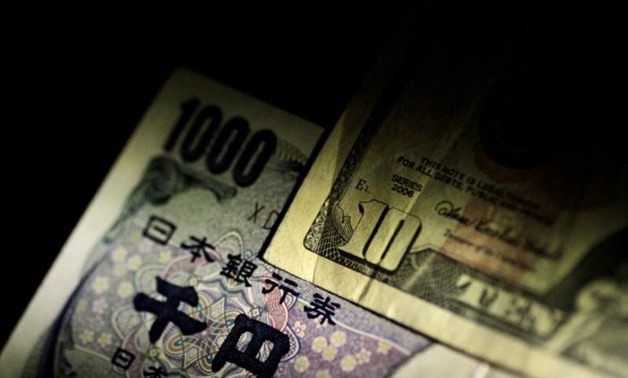
FILE PHOTO: U.S. Dollar and Japan Yen notes are seen in this June 22, 2017 illustration photo. REUTERS/Thomas White/Illustration
SINGAPORE - 21 December 2017: The dollar edged higher against the yen on Thursday, after comments by Bank of Japan Governor Haruhiko Kuroda reinforced expectations that the BOJ was in no hurry to move away from its ultra-loose monetary policy.
Speaking after the BOJ kept interest rates steady as widely expected, Kuroda said his earlier reference to a “reversal rate” did not indicate a change in his thinking on monetary policy.
Kuroda also said the BOJ will continue patiently with monetary easing as inflation was still well off its 2 percent target and that he doesn’t see a need to review the BOJ’s yield curve control policy.
The dollar rose 0.2 percent to 113.56 yen, having traded around 113.40 yen ahead of Kuroda’s news conference.
The greenback has gained 0.8 percent against the yen so far this week, and a rise beyond last week’s high of 113.75 yen would send it to its highest point in more than a month.
Kuroda’s comments did not contain anything particularly new, and suggested that the BOJ will persist with its loose monetary policy, said Satoshi Okagawa, senior global markets analyst for Sumitomo Mitsui Banking Corporation in Singapore.
“Dollar/yen will probably continue to take cues from moves in U.S. Treasuries,” Okagawa said.
The dollar could edge higher versus the yen, if the U.S. 10-year yield rises further after it set nine-month highs this week, Okagawa added.
Market players had been focusing on Kuroda’s comments, looking for clues on whether the BOJ is getting closer to joining the U.S. Federal Reserve and central banks in Europe, in winding back stimulus.
A speech by Kuroda in November had stirred speculation that the BOJ could edge away from crisis-mode stimulus earlier than expected. That was when he mentioned the concept of a “reversal rate” - a level at which low interest rates start to have more harmful side-effects than benefits.
Analysts said the dollar was supported against the yen after the U.S. 10-year Treasury yield rose to a nine-month high on Wednesday as investors worried over whether the U.S. tax overhaul would lead to higher U.S. debt, increased bond issuance and more aggressive rate hikes by the Fed.
The Republican-controlled U.S. House of Representatives gave final approval on Wednesday to the biggest overhaul of the U.S. tax code in 30 years, sending a sweeping bill to President Donald Trump to sign.
The euro held steady at $1.1872, having gained around 1 percent so far this week, supported by a rise in German bond yields.
Against the yen, the euro touched a fresh two-year high at 134.81 yen on Thursday, its strongest level since October 2015.

Comments
Leave a Comment